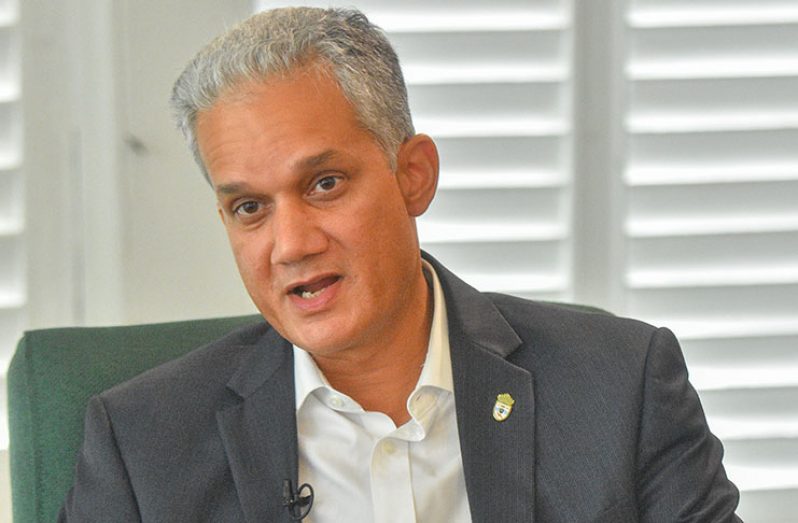…Petroleum adviser says oil-and-gas policies must transcend election cycles
THERE is need for Guyana to enforce legislation, policies and regulations in the emerging oil-and-gas sector that cannot be easily influenced by politicians, presidential adviser on Petroleum Dr Jan Mangal told reporters on Wednesday.
Dr Mangal, who has a Doctorate in Offshore Geotechnical Engineering from the University of Oxford and a Bachelor’s Degree in Civil Engineering from the University of Edinburg, said, “You need legislation that can transcend political cycles, that will protect the industry from coming to a standstill when there is a change of government.”
He pointed to Ghana as an example of a change of government which saw experts in the oil-and-gas sector aligned to the previous government being replaced. “That is not good for the industry. This industry is a long-term industry, it is a 20, 30, 50- year industry – we need regulations and management of the industry that transcends [sic] electoral cycles,” the petroleum expert added.
He pointed to the Petroleum Commission Bill 2017, which was sent to the Special Select Committee for bi-partisan deliberations in June. Dr Mangal, an expert in offshore and civil engineering, told reporters that there has been some back and forth on the piece of legislation and noted that efforts are being made to change parts of it. The petroleum expert said it is within his remit to find that which is good for the long term and will prove beneficial to the Guyanese people and not for “short-term, political interests.”
Subject Minister Raphael Trotman had said repeatedly that there were extensive consultations on the legislation which seeks to provide a legal framework for regulating and monitoring of the sector. The legislation was drafted by the Oceanic and Natural Resources Advisory Commission of the Commonwealth Secretariat and then sent to the government for extensive consultations.
The bill, the minister said, provides a legal framework for an efficient, safe, effective and environmentally responsible exploration, development and production of petroleum in Guyana.
However, the opposition People’s Progressive Party (PPP) has said that the Bill must be properly scrutinised. That party’s Member of Parliament, Irfaan Ali, had said that the independence of the Petroleum Commission is being challenged in a number of provisions within the legislation. “…this will certainly affect its ability to operate in a fair, open, objective, and non-discriminatory manner as envisioned in Section 6 subsection 1,” he told the National Assembly back in June.
Under Section 8 of the Bill, Ali said the power of the minister to give directions to the commission shows that the commission would be incapable of working without the intervention and control of the minister.
As such, Ali contended that Trotman would be empowered to dictate the number of persons the commission should employ, the terms and conditions of the employment of the staff of the commission, and how the commission should use its funds.
Transparency
Meanwhile, Dr Mangal said since taking up his post as adviser, he has stressed the importance of transparency and reminded that without transparency, the oil-and-gas sector can quickly become unsuccessful. He believes that the independence of the commission is to have a consensus-based approach to management as opposed to decision-making being overly concentrated.
The petroleum expert used Mexico as an example of an oil-and-gas nation that has gone through significant transformations recently. He told reporters that Mexico has learnt a lesson and noted that “they know that politicians do not manage the industry well…because they think election to election; they don’t think 20, 30 years [down the line].”
“There is ample evidence out there to support the need for less concentrated political-type decision- making and that there is a need for more consensual, independent-type decision-making,” Dr Mangal declared. He believes that the entire legislative framework, which includes the Petroleum Commission Bill, the Sovereign Wealth Fund, and the Petroleum Act, needs to be addressed holistically. The expert stressed the importance of consensual-type decision-making, while stressing that boards need to have a longer life-span.
It is his opinion that boards ought to have a life of four to five years and board members ought to be free to “speak their minds.” “They can speak their minds…and add the value that they bring” and not be fearful of victimisation. Dr Mangal, who has worked in marine and oil-and-gas industries for the past 18 years globally, stressed that boards have to have security so that members “don’t feel if they go against someone they are going to get fired. You need boards that people will be there for four to five years or a long time.”





.jpg)








